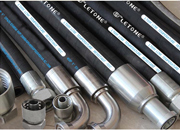How to Select a Chemical Hose
2022-10-10 14:39:38
The selection of a chemical hose is crucial to ensuring the safety of your operations. The chemical resistance of a chemical hose is dependent on the type of medium being conveyed, its temperature, working pressure, and many other factors. It is important to use safety data sheets for the correct selection. Static charge risks must also be considered if the hose will be used in an explosive or hazardous area.
chemical hose
Chemical hoses can be used in many industrial applications, including loading and unloading liquid chemicals. They are also used for diverse technological processes in the chemical and food industries. Additionally, they are used in laboratories. These hoses have excellent chemical resistance and can handle various types of chemicals. These hoses are most commonly used to transport liquid chemicals. However, they can also be used to transport other materials such as air and water.
Before purchasing a Chemical Hose, gather data about the chemicals you're working with. Chemical resistance is determined by the type, concentration, temperature, and working pressure. You should also check the safety data sheets (SDSs) for the chemical hose that you are considering purchasing. Consider the static charge risk, especially when the chemical hose will be used in an explosive area.
heat resistant rubber cement radiator hose
You should select the best heat resistant rubber cement radiatorhose for your needs. This type of hose has a high temperature resistance and can withstand hot water and anti-freeze fluids. The material that is used for this hose is EPDM rubber.
EPDM auto radiators should contain at least 35% rubber. It will lose heat resistance and reduce its service life. These auto radiator hoses will perform best when there is enough rubber packing. As long as the amount of EPDM rubber is controlled at a reasonable level, they will have a long service life.
Chemical hose that is resistant to acid alkali
Acid and alkali resistant chemical hoses are available in a wide range of sizes. The HL-E-C series has an inner diameter ranging from 13 mm to 50 mm. They have an EPDM coating and are UV, ozone, and abrasion resistant. They come in pre-cut lengths of 1, 3, or 10 meters or in rolls of 40 meters.
Chemical hoses that are acid alkali resistant are made from ultra high molecule weight (UHMW), polyethylene tubing. This tubing is resistant to 98% common chemicals. They are covered with a corrugated blue EPDM and have a steel wire spiral for added strength. These hoses can be used in agriculture, construction sites, or buildings.
Silicone hoses are also available. This type of hose is composed of a thin layer of acid and alkali resistant silica gel that is tightly covered by an electrical grade polyethylene spiral wire. This material is also nonconductive, which ensures normal operation of electrical equipment.